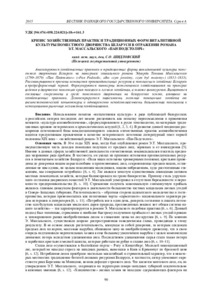Please use this identifier to cite or link to this item:
https://elib.psu.by/handle/123456789/13631Full metadata record
| DC Field | Value | Language |
|---|---|---|
| dc.contributor.author | Шидловский, С. О. | - |
| dc.date.accessioned | 2015-09-18T13:36:21Z | - |
| dc.date.available | 2015-09-18T13:36:21Z | - |
| dc.date.issued | 2015 | - |
| dc.identifier.citation | Вестник Полоцкого государственного университета. Серия A, Гуманитарные науки. - 2015. - № 9. – C. 90-94. | ru_RU |
| dc.identifier.issn | 2070-1608 | - |
| dc.identifier.uri | https://elib.psu.by/handle/123456789/13631 | - |
| dc.description | The Crisis of the Business Practices and Traditional Forms of Life-Support Culture of the Landed Gentry of Belarus in the Reflection of the Novel By E.T. Massalsky «Pan Podstoliс». S. Shydlouski, Cand. East. Sciences, Associate Professor (Polotsk State University) | ru_RU |
| dc.description.abstract | Анализируются хозяйственные практики и традиционные формы виталитивной культуры поместного дворянства Беларуси на материале социального романа Эдуарда Томаша Массальского (1799–1879) «Пан Подстолич» («Pan Podstolic, albo czym jesteśmy, czym być możemy») (1831–1833). Рассматриваются причины истощения производительных ресурсов в помещичьем хозяйстве Беларуси в предреформенный период. Формулируются паттерны экстенсивного хозяйствования на примерах ведения в дворянских поместьях края полевого и лесного хозяйства, а также винокурения. Выявляются сословные стереотипы в среде поместного дворянства на белорусских землях, влиявшие на хозяйственные практики. Демонстрируется зависимость местных помещичьих хозяйств от внешнеэкономической конъюнктуры и одновременно неподготовленность большинства помещиков к использованию рыночных механизмов хозяйствования.= in the article business practices and traditional forms of life-support culture of the landed gentry of Belarus on the material social novel by Edward Tomas Massalsky (1799-1879) «Пан Подстолич» («Pan Podstolic, albo czym jesteśmy, czym być możemy») (1831-1833) are analyzed. the causes of the depletion of the productive resources in the manorial economy of Belarus in the pre-reform period are examined. Patterns of extensive economy, examples of reference in the noble estates of the edge of the field and forestry, as well as distilling are formulated. A class stereotypes in the environment of the landed gentry in the Belarusian lands, influencing farming practices is identified. the dependence of local landowners farms on external economic conditions and a lack of a majority of the landowners to the use of market-based economic mechanisms are demonstrated. | ru_RU |
| dc.language.iso | ru | ru_RU |
| dc.publisher | Полоцкий государственный университет | ru_RU |
| dc.relation.ispartof | Веснік Полацкага дзяржаўнага ўніверсітэта. Серыя А, Гуманітарныя навук | be_BE |
| dc.relation.ispartof | Herald of Polotsk State University Series A, Humanity sciences | en_EN |
| dc.relation.ispartof | Вестник Полоцкого государственного университета. Серия A, Гуманитарные науки | ru_RU |
| dc.relation.ispartofseries | Серия A, Гуманитарные науки;2015. - № 9 | - |
| dc.rights | open access | ru_RU |
| dc.subject | Государственный рубрикатор НТИ - ВИНИТИ::ОБЩЕСТВЕННЫЕ НАУКИ::История. исторические науки | ru_RU |
| dc.subject | Помещичьи хозяйства Беларуси (1831–1833) | ru_RU |
| dc.subject | сословные стереотипы | ru_RU |
| dc.subject | хозяйственные практики | ru_RU |
| dc.subject | роман «Пан Подстолич» | ru_RU |
| dc.subject | Массальский Э. Т. (1799–1879) | ru_RU |
| dc.title | Кризис хозяйственных практик и традиционных форм виталитивной культуры поместного дворянства Беларуси в отражении романа Э.Т. Массальского «Пан Подстолич» | ru_RU |
| dc.type | Article | ru_RU |
| dc.identifier.udc | [94(476)-058.224:821]«18»=161.3 | - |
| Appears in Collections: | 2015, № 9 | |
Items in DSpace are protected by copyright, with all rights reserved, unless otherwise indicated.
